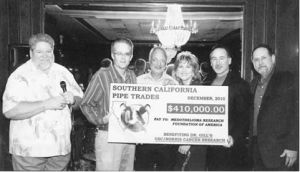What is malignant mesothelioma?
Mesothelioma, better known as malignant mesothelioma is a form of cancer that affects people who have been exposed to asbestos by working in an environment where they are exposed to and breathed in the asbestos particles, or they have lived in a home containing asbestos. Many people have lived in an environment with asbestos particles floating around and were not aware of it.
Malignant mesothelioma frequently starts out in the chest; one breathes in the sharp hooked particles-look like fish hooks when viewed under a microscope-however asbestos fibers can be ingested with food and drink.
The most common form of mesothelioma is plural mesothelioma. Asbestos particles are inhaled, the particles hook into the lungs. From there the particles slowly work their way to infiltrate the plural lining, which is the sac that contains the lungs. The patient cannot excrete these fibers; they stay within the body, because they are durable.
The body tries to fight the foreign particles that have taken up residence in the body. The asbestos particles cause irritation and as a result cancerous tumors start to develop. The plural form of the disease is very aggressive.
If you have been diagnosed with malignant mesothelioma, you have a cancer of the serous membranes, which are the membranes of glandular cells that secrete serous fluid. Serous membranes in the plural cavity allow the lungs to move with inhalation and expiration smoothly without friction. Many people have the have the disease, or know someone that has the disease have the misconception that mesothelioma is a primary form of lung cancer, but it isn’t. The cancerous tumors develop in the plural cavity. As the tumors grow there is less space in the plural cavity and the lungs become compressed. With lung compression comes respiratory failure.
What is peritoneal mesothelioma?
Peritoneal mesothelioma is cancer of the lining, the serous membranes, of the abdominal cavity. The serous membranes line the cavity and also line the organs. The serous membranes that cover the organs is also called the viscera, or visceral membranes. Peritoneal mesothelioma is the second most common type of mesothelioma. The cause of peritoneal mesothelioma is not clearly understood; however, it is believed the asbestos fibers get to the abdominal cavity two different ways.
It is believed that when a person inhales the asbestos fibers that over time the fibers break apart into smaller particles and find their way into circulation, and then as the blood vessels become smaller the particles work their way through the vessels and into different areas of the body. One such place is the peritoneum, but mesothelioma can develop in the testicles and other parts of the body.
The other theory is that the home is infiltrated with asbestos particles. When the person works in an environment the particles are all over the clothes and float in the air on dust particles. The kitchen are can become loaded with floating particles, and the particles can also settle on plates, glasses and silverware. It is believed that a person can ingest the particles. When they do swallow the asbestos particles they work their way through the stomach lining and invade the lining of the abdomen and the lining of the organs. Once the particles become lodged the peritoneal cavity they cause chronic irritation and then the tumors begin to grow.
What is testicular mesothelioma?
Mesothelioma of the testicles is a rare form. It is believed that asbestos fibers travel from the stomach to the peritoneum and through to the testicles, because the lining of the testicles is an out-pouching of the abdominal peritoneal lining.
Misconceptions
Mesothelioma is sometimes called asbestos lung cancer, or asbestosis. Both terms are incorrect. Mesothelioma is not lung cancer, the disease does not cause tumors in the lungs. The tumors are in the plural lining that surrounds the lungs and compresses them until the patient goes into respiratory failure.
Asbestosis is caused by the inhalation of asbestos fibers. They become stuck in the lungs and cause irritation, but does not cause cancerous tumors. This is a very serious lung disease that mimics the symptoms of asthma and emphysema. It is not to be confused with mesothelioma. As the cancer develops in the peritoneum, the serous membranes rapidly secretes fluid into the abdominal area, which causes pain and discomfort as the organs become compressed. Patients are often symptomatic for approximately 6 months before a diagnosis of peritoneal mesothelioma is made.
Staging
There is no staging system specific to mesothelioma; however, the staging is the same as is done with other forms of cancer, which is the TNM system-(T) tumor, (N) lymph nodes, (M) metastasis. The first stage (Tumor) indicates a lesion that has developed into a tumor. The second stage (Lymph Nodes) indicates that the tumors are contained within the organ surfaces and the lining of the abdomen. The third stage (Metastasis) indicates cancer cells are leaving the tumor and invading other organs of the body. Once metastasis has occurred the disease is difficult to treat.
Prognosis and treatment
Treatment of mesothelioma depends on the location and stage, and it also depends on the condition of the patient, because patients are often told their survival rate is between 8 and 12 months. Although there are special cancer centers around the country that do have better statistics. There are three types of treatments to treat mesothelioma: surgery, chemotherapy, and radiation therapy. Very often it takes more than one form of treatment, such as surgery with radiation or chemotherapy with radiation. Surgery normally does not remove all of the cancer from the body. Time is of the essence in the prognosis and treatment of mesothelioma. When the cancer has metastasized to other organs it is much more difficult to treat.







